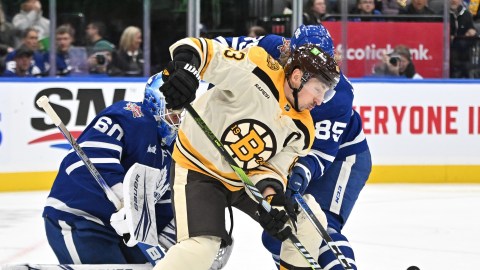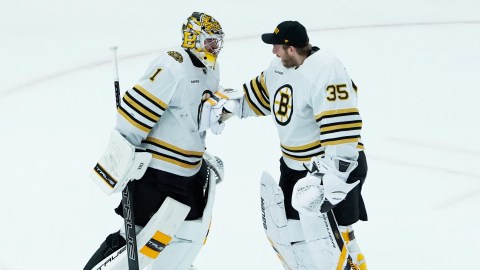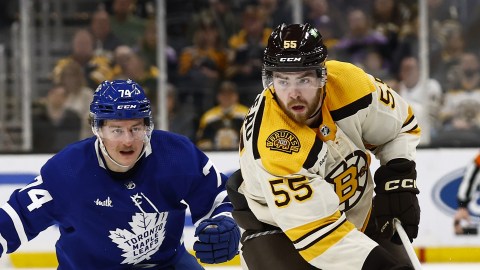There's nearly eight months before the NHL's collective bargaining agreement expires on Sept. 15, but the time has come for both sides to get to work on heading off another potentially disastrous work stoppage.
The league and the NHL Players' Association have yet to even begin negotiations, but the first shots in the next hockey labor war have already been fired. The opening salvo came earlier this month when the NHL Players' Association shot down the league's realignment plan.
That move has led to much fretting over the chances of avoiding another work stoppage before the 2012-13 season, but not all involved see that situation as a dire warning of future impasses.
"I don't think so," Bruins player representative Daniel Paille told NESN.com in a recent interview. "I think there's a bigger picture here and this small setback shouldn't affect us in the future. There's a lot more different categories to worry about and bigger problems for us to fix."
Since taking over as the Bruins' player rep when Mark Stuart was traded last February, Paille has been optimistic that a new CBA will be reached without a stoppage, and the disagreement over realignment hasn't changed his opinion.
"I am still optimistic," Paille said. "I feel that we should have learned our lesson the first time and realize there's a lot more at stake. It's not just about us. It's about everyone around us. I feel optimistic about it. That's just my personal opinion, and hopefully everyone in the league sees that as well."
The NHL certainly should have learned from the last owners' lockout that cost the league the entire 2004-05 season, but speaking to reporters in Anaheim on Wednesday, commissioner Gary Bettman sounded less like a man trying to learn from history than one doomed to repeat it.
"I'm not sure it's about learning lessons, because the lesson that everybody knows — and it's not one you have to learn — is that you want to not have work stoppages," Bettman said. "They're not fun. They're counter-productive. But if you're in a situation as we were where there were fundamental problems that had to be addressed, you have to address the problems. Because you can't live with a dysfunctional system. So it's not that we learned anything. It was that we did what we had to do at the time, and obviously if you look back over the last six and a half years, the league is in a stronger position than it was when we started collective bargaining for that agreement."
The league is stronger now. Revenues have grown dramatically and continue to soar, but that does not mean the NHL can afford another work stoppage. Bettman concedes the league as a whole is healthier than ever, but not all teams are benefiting equally from the current system.
The salary cap put in place has grown from a $39 million limit with a $21.5 million floor when first implemented in 2005-06 to a $64.3 million maximum and $48.3 million floor this season. Reaching that floor has been a struggle for some smaller-market teams, and the expansion into many non-traditional markets has not fared well. Atlanta was relocated to Winnipeg this season and Phoenix remains owned by the league, which has been unable to find a suitable local owner and may be forced to move that franchise as well.
Bettman acknowledged the overall growth of the league, but wouldn't discuss the struggles of any individual teams or markets.
"I don't even want to get into that," Bettman said. "The fact is we're having another terrific season. This will be another record-breaking season for us, both in terms of revenue and attendance. I don't see any reason for anybody to be distracted by collective bargaining, certainly not now."
But time is running short. The league and NHLPA have not sat down at the bargaining table yet, in large part because new NHLPA director Donald Fehr has needed time to get up to speed on the finances of the game and the issues of most concern to his new constituency. Fehr has stated throughout the season that he would like to meet with the league's negotiators soon after the All-Star break, which comes later this month. Considering the gulf between the sides, the sooner they start talking the better, as they may need all the time they can get to try to hash out a new deal.
"Well, Don Fehr has repeatedly said that he wouldn't be ready until after the All-Star [weekend]," Bettman said. "My guess is that at some point in the next few weeks, we'll probably sit down, assuming the union is comfortable doing that. There's a pretty steep learning curve in terms of the business from the union's standpoint, what the players are focused on, and we've been respectful of that process. So whenever they're ready, we're ready. We've been ready."
Bettman was also ready to throw a few pointed barbs at the union over the aborted realignment plan, which the league still hopes to implement in the future.
"The most significant thing I can say about that is the governors were overwhelmingly in support of the plan," Bettman said. "It's something that we, as a league, thought was the right thing to do for our fans, for the team, for the game. But we made the decision based on the position that the union was taking to try not to be confrontational right now. Ultimately, our goal will be to be to implement the will of the board [of governors].
"We think it was a perfectly sensible and reasonable plan," Bettman added, "but the union obviously didn't agree and we just didn't think this was a sensible time to be confrontational so we said we wouldn't implement it now."
The NHLPA didn't find the idea quite as sensible or reasonable. Paille detailed the main concerns the players had with proposal, which would have eliminated the current six-division format with three five-team divisions in each of the Eastern and Western Conferences and replaced it with four new conferences, two with seven teams and two with eight. The first two rounds of the playoffs would be played within the conference, with the top four teams in each qualifying.
The unbalanced number of teams in the proposed conferences was the major sticking point for the players. "Obviously if you're in the eight-team [conferences], you have less chance of making the playoffs," Paille said.
The other issue concerned the effects on travel for individual teams, and the league's refusal to supply a detailed breakdown of how it would be affected. With increased inter-conference play over the current format, many teams may have actually faced increased travel even with better geographical balance within the new conferences.
Like Bettman, Paille wouldn't rule out the players eventually agreeing to a modified version of the realignment plan, one that may actually include input from the players.
"In the future, who knows?" Paille said. "It might change, but for now, we just couldn't do it."
Hopefully in the next eight months, the league and the NHLPA will find more common ground on the bigger issues involved in hammering out a new CBA. Because if they don't, another lockout could be looming, and that's one thing the sport really cannot afford to do again.
Have a question for Douglas Flynn? Send it to him via Twitter at @douglasflynn or send it here. He will pick a few questions to answer every week for his mailbag.



